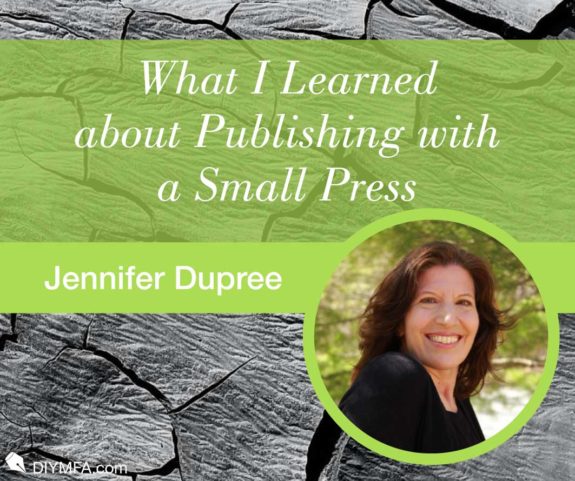My novel, The Miraculous Flight of Owen Leach, was published by Apprentice House Press in April 2022. I didn’t necessarily think I’d land with a small press, but I’m not sorry I did.
I signed with an agent just before I finished my MFA program. She spent the next couple of years trying to sell my book to publishers, but had no success and no interest in selling the book to a small press.
Fair enough, because agents only make money if the writer makes money and small presses don’t pay much. She and I parted ways amicably, and I attempted to find a new agent, only to realize that agents are reluctant to take on a project that has already been shopped around unless the project has had a significant revision, which mine hadn’t.
But I believed in my novel, and while I could have put it away while I worked on new projects, I wanted to see it in the world. And so, I started looking at small presses.
Here’s what I learned about publishing with a small press along the way:
Research small presses the same way you’d research an agent
There are a lot of small presses out there and they won’t all be a good fit for your project. I was drawn to Apprentice House because it’s an entirely student-run press, and I figured that no one cares less about money than students.
I was feeling a bit jaded by the focus on money my agent had—I wanted to write for the art, not just the money, and so a student-run press was a great fit for me. A student-run press might not be the right fit for you if you want consistency, though, because at Apprentice House, there’s someone new working on your book every semester. I liked having lots of input and ideas and feedback, and the students were as warm and as engaged as I imagined they would be, so, for me, the pre-publication experience was lovely.
Read your contract
I was really happy to have a contract for my book, and I did skim it, but I didn’t spend any time thinking about the implications of what I’d signed until well after my book came out.
Namely, when I started to work on my second book and realized my contract stated that Apprentice House had the right of first refusal for it. Which means they get first dibs, and while I can turn down their offer, I still have to give them a chance.
This is pretty standard, and I’d pretty much made peace with the fact that AH would look at my novel and they would either:
- Like it and offer the same terms as the first novel, which I was prepared to turn down in the hopes of a more lucrative book deal, or
- Not like it and then I would cry for a month.
But then I had lunch with a writer friend who told me she asked to have the right of first refusal taken off her contract (with a different small press). She reasoned that her next project was nothing her current publisher would ever put out, so why waste their time and hers? I was impressed with her forward-thinking and I wish I’d taken the time to think about my own contract a little more.
Have someone else copyedit/proofread your work
Apprentice House, and most small publishers, will not copyedit or proofread for you. And even if you think you have a good handle on grammar, have someone else—preferably more than one person—read your uncorrected proof.
Trust me, you’ve read your own work too many times to really know what’s on the page. By the time I got my uncorrected proofs, I’d say I’d read my manuscript, whole or in parts, at least fifty times. And yet, I still had a reference to the “Eater” Bunny in there. (Easter was what I was going for)
The good news about a small press is that if you happen to miss typos, the print runs are generally small, and you’ll be able to fix the mistake in the next run. The bad news is that too many typos just make the book seem unprofessional and after all your hard work, you don’t want that.
Develop a marketing plan
Even if your publisher works with you to create a marketing plan (which mine did not), you’ll want to come up with as many ideas as you can. Brainstorm like crazy, but make sure they’re things you’re willing and able to do.
For me, people-ing is exhausting, and I needed rest days in between events. I know some writers who thrive on talking about their work, and that’s great and amazing. Play to your strengths, especially if you’re thinking about the long game—for me, I knew my current work-in-progress would suffer if I didn’t occasionally hit pause.
When thinking about events, tap into your resources. My day job is as a library director, so I felt comfortable sending out promotional postcards to every library in my state and neighboring states, and I did not fail to mention that I am a library director. I booked most of my events this way.
I also contacted people I’d gone to graduate school with and, even though that was a little harder for me, I asked them to do events with me. I don’t like being the center of attention, and so, for me, events with other writers make me much more comfortable (but it’s so hard to risk someone saying “no!”). Events with multiple authors draw a bigger crowd, so it’s a win-win in my eyes.
I also attended book fairs, taught workshops, wrote essays about writing my book, and even got the chance to be interviewed on stage in front of a live 100-person audience as part of a music/performing arts variety show.
Not all of these things were part of my original marketing plan, but a lot of them came about because I had a marketing plan. The variety show, for example, was the direct result of me contacting a bookseller in a neighboring state. I didn’t hear from her for months and assumed she wasn’t interested in the book event I’d pitched, but then she contacted me and said she thought of me when this event came on her radar, so she suggested me to the variety-show producer.
Be flexible with your expectations
Not everything is going to go according to plan, but in the end, small presses are doing a lot of good work for not a lot of money. It’s important to ask for what you need, whether it’s clarification, or a report on sales, or support with an event, but it’s also important to remember to stay polite, professional, and as accommodating as you can be. It’s a team effort, after all.

Jennifer Dupree is an assistant editor for The Masters Review, a librarian, and a former bookstore owner. She has an MFA in Creative Writing from USM’s Stonecoast program. Her work has appeared or is forthcoming in December, Solstice, The Masters Review, On the Rusk and other notable places. She is the winner of the Writer’s Digest Fiction Contest for 2017, and a two-time winner of a Maine Literary Award (2022, 2006). Her novel, “The Miraculous Flight of Owen Leach” was published in April of 2022.
You can learn more about Jen on her website or catch her on facebook.







